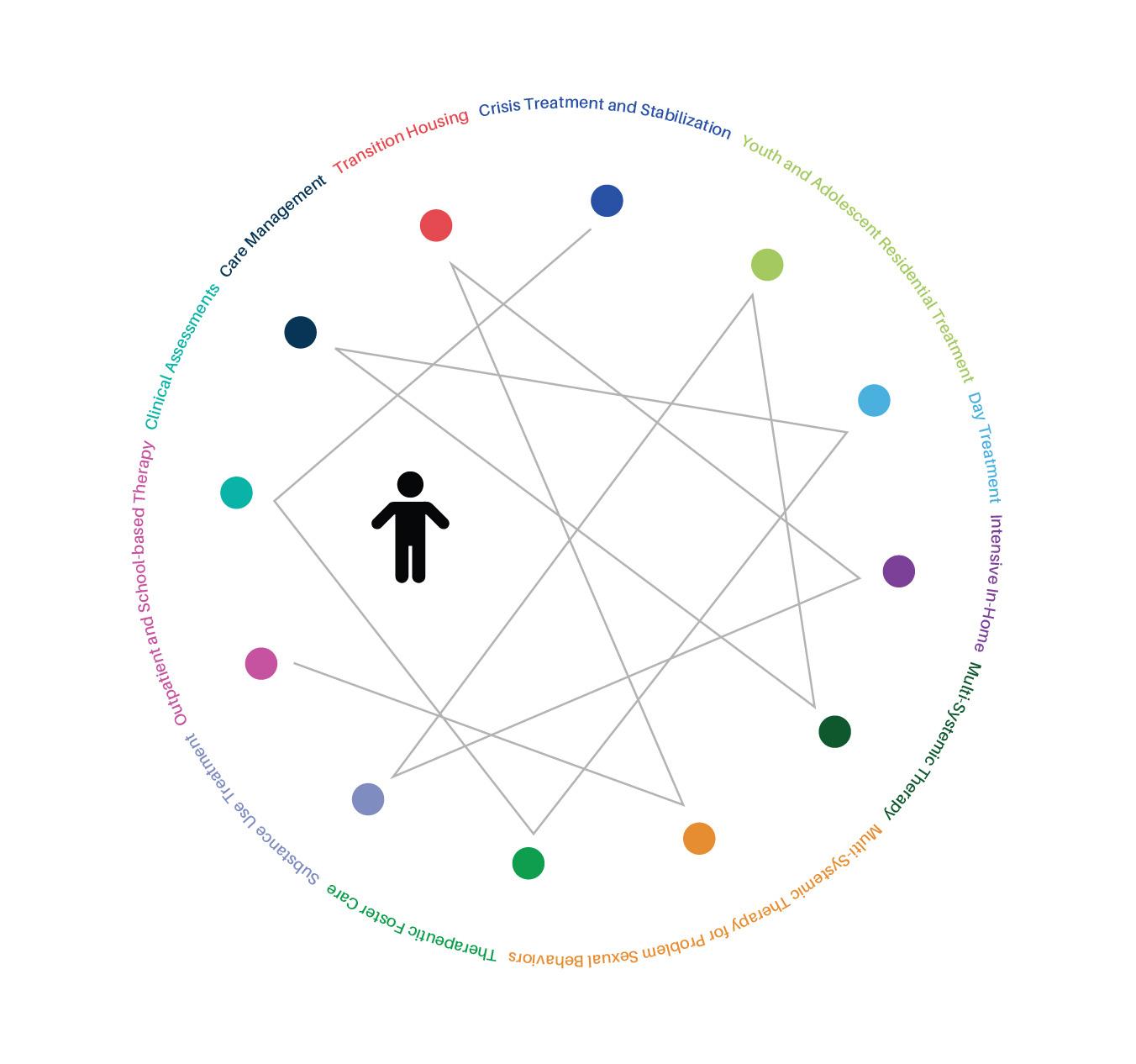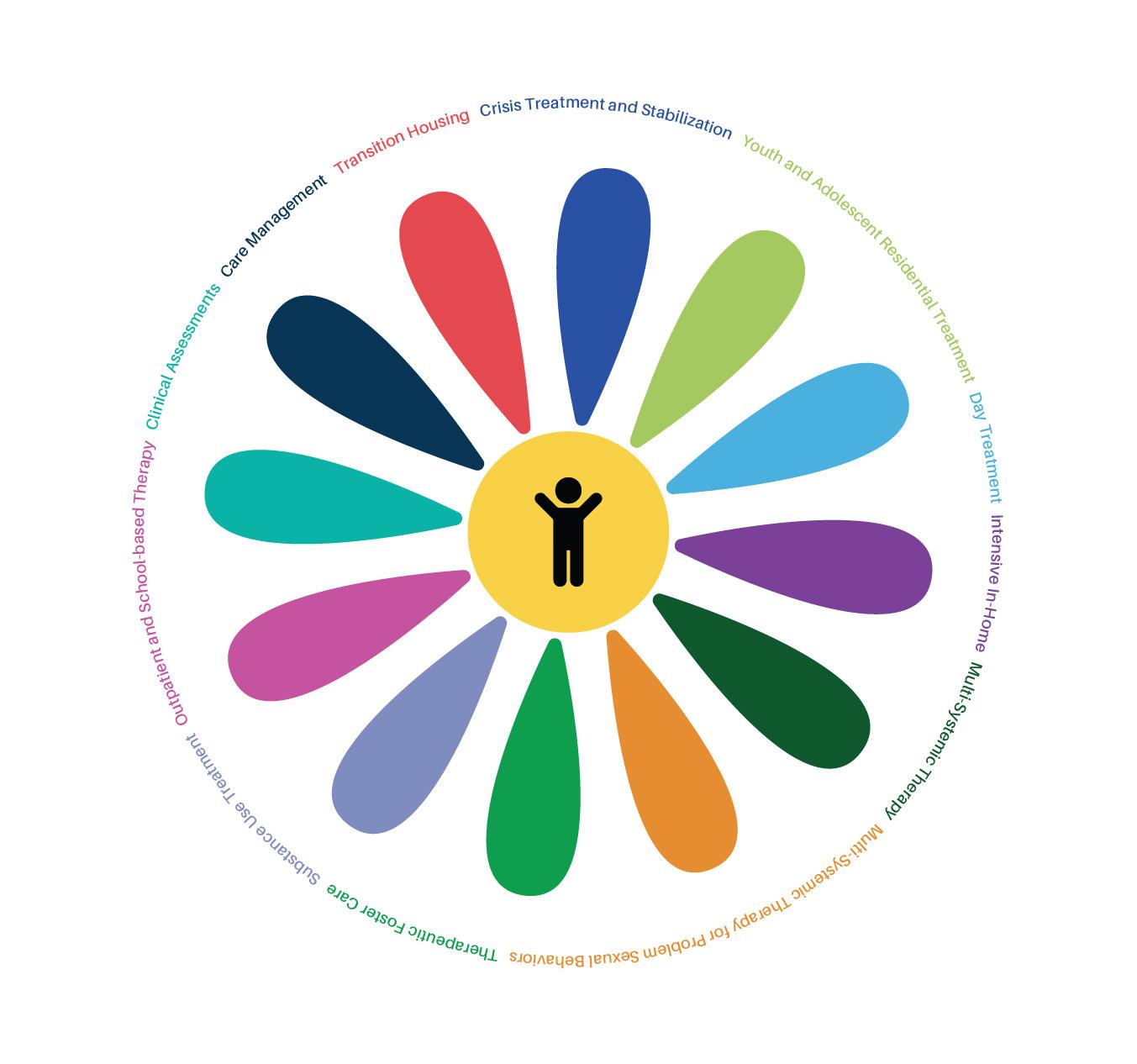

2024 Outcomes Report
Alexander Youth Network remains steadfast in its mission to support children as they navigate and overcome mental health challenges. We continue to believe that an integrated and family-centered approach is the most effective way to provide care at the point of need. By involving the entire family in treatment planning and goal setting, we create a stronger foundation for lasting success.
The outcomes in this year’s report demonstrate the profound impact of our comprehensive service array. Together, we are helping children heal and empowering families to thrive.
Client Demographics


Client Diagnosis
Anxiety Disorders
A mental health disorder characterized by feelings of worry, anxiety, or fear that are strong enough to interfere with one’s daily activities. Examples of anxiety disorders include panic attacks, obsessive-compulsive disorder, and post-traumatic stress disorder. Some symptoms include stress that’s out of proportion to the impact of the event, inability to set aside a worry, and restlessness. Many of the children we serve don’t have the ability to cope with the everyday challenges of life such as a change in schedule, or a perceived negative interaction with a staff or friend.
Mood Disorders
Mood disorders are a category of illnesses that describe a serious change in mood. Illness under mood disorders include: major depressive disorder, bipolar disorder (mania- euphoric, hyperactive, over inflated ego, unrealistic optimism), persistent depressive disorder (long lasting low grade depression), cyclothymia (a mild form of bipolar disorder), and SAD (seasonal affective disorder).
Disruptive Disorders
Disruptive disorders are a group of mental health conditions in children and adolescents characterized by persistent patterns of disruptive, defiant, or antisocial behavior that significantly impair their daily functioning in home, school, or social settings. These disorders often involve difficulties in regulating emotions and behaviors, leading to challenges in relationships and meeting societal expectations.
Neurological Disorders
Neurological disorders are medically defined as disorders that affect the brain as well as the nerves found throughout the human body and the spinal cord. Structural, biochemical or electrical abnormalities in the brain, spinal cord or other nerves can result in a range of symptoms. Common types of neurological disorders are attention-deficit hyperactivity disorder (ADHD), schizophrenia, and bipolar disorder.
Alexander Youth Network uses a traumainformed approach to treat these disorders.
Our approach employs rhythmic, repetitive, relational, rewarding, relevant and respectful interventions to get to the heart of trauma and allow for healing to begin. This approach provides positive outcomes for the children we serve and provides them with the coping skills they need for lasting change.
Our Treatment Successes
Customer Satisfaction
Transforming Care: Reducing Emergency Room Visits & Improving Length of Stay
Residential Treatment
of families were satisfied with access to our services 89% of kids transitioned from residential treatment to a less restrictive setting 94% 94%
Our residential programs saw a 13% decrease in the average length of stay, allowing children to return to their families sooner and transition to communitybased support more quickly. 13%
A 56% decrease in emergency department use for crisis intervention means that more children are receiving timely, specialized care through our services, reducing ER dependency. 56%
We take pride in the success of our treatment interventions, which have not only enabled children to remain at home and within their communities, but also facilitated a smoother transition for those in residential treatment to lower levels of care. of clients remained in school due to services provided of clients remained in the home due to services provided 89%
Global Assessment
Multi-Systemic Therapy of kids showed improvement or maintenance during their treatment 87%
ACORN Model
The ACORN model is used as a comprehensive and dynamic tool to assess and track advancements in behavioral health. Its holistic approach integrates various dimensions of well-being, enabling a broader understanding of individuals’ mental and emotional states.
By encompassing aspects such as activities, connectedness, outlook, resilience, and needs, the ACORN model provides a nuanced framework for evaluating the multifaceted nature of behavioral health improvements while children are receiving treatment. This holistic perspective allows for more accurate and personalized interventions, fostering a more effective and tailored approach to enhancing overall mental and emotional well-being. The added benefit of Measurement-Informed Care tools is that they also allow Alexander to track functional improvement during the client’s treatment using feedback from the clients and their caregivers. Tracking progress more frequently during monthly treatment teams allows the treatment team to adjust interventions while still receiving services providing greater gains at discharge for children and families. Alexander Youth Network began using the ACORN (A Collaborative Outcomes Research Network) as a Measurement-Informed Care tool in 2018.
What is ACORN measuring?
When one conducts a factor analysis on anxiety and depression within the ACORN model, they observe a singular common factor known as Global Distress instead of distinct anxiety and depression factors. Within ACORN questionnaires, there are items closely resembling those found in the PHQ9/GAD7, addressing feelings of sadness, sleep, eating habits, energy levels, concentration, and self-harm. The ACORN model allows Alexander to observe outcomes and effectiveness in our Programs and Services effectiveness.
The ACORN tool provides us with a three-tier view:
1) Individual Client Improvement while in care as mentioned above
2) Program Effectiveness based upon the client progress, and
3) Agency Effectiveness compared to other agencies using the tool
Evaluating Alexander’s Ability to Treat Behavioral Health Symptoms Effectively
Alexander Youth Network prides itself on comprehensive and effective treatment for the kids we serve. Our ACORN model scores denote our effectiveness as compared to the national average. Alexander’s effectiveness score of 0.99 is a rating of “Highly Effective”, which is above the national average of 0.82. This shows our dedication to good outcomes for behavioral health treatment.
Clinical Range Cases - Severity Adjusted Effectiveness Score
Measuring Treatment Excellence
In academic journals, researchers employ ‘effect size’ to assess treatment outcomes. Following extensive research in psychotherapy, it is determined that an effect size of 0.5 or greater is “effective” and an effect size of 0.8 or greater is “highly effective.”
Source: https://acorncollaboration.org/
Source: https://acorncollaboration.org/
Alexander Youth Network ACORN National Average
Alexander Youth Network is the whole solution for children’s mental health.

Without a Service Array

With a Service Array
Alexander Youth Network and its subsidiaries, The Relatives and Youth Focus, served over 10,000 kids in 2024.
Alexander Programs & Services
24/7 Mental Health Stabilization & Crisis Care
24/7 Residential Treatment
Day Treatment
Therapeutic Foster Care
Community-Based Programs
Outpatient Therapy
Care Management
Clinical & 30-Day Assessments
Learn more: alexanderyouthnetwork.org
